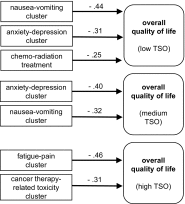Relationship among symptom clusters, quality of life, and treatment-specific optimism in patients with cancer
- PMID: 29473117
- PMCID: PMC6018574
- DOI: 10.1007/s00520-018-4102-8
Relationship among symptom clusters, quality of life, and treatment-specific optimism in patients with cancer
Abstract
Purpose: There is increasing evidence that disease and therapy-related symptoms frequently co-occur in so-called symptom clusters (SCs), which may significantly impair quality of life in patients with cancer. Although psychosocial resources may play pivotal roles in maintaining or improving quality of life, they have been neglected in SC research. Therefore, we aim to identify SCs and their relative impact on quality of life when psychosocial resources are accounted for.
Methods: Patients with cancer (n = 304) undergoing chemotherapy or chemo-radiation therapy participated in a cross-sectional survey consisting of measures assessing symptoms, quality of life, resilience, treatment-specific optimism (TSO), and social support. Exploratory factor analyses and multiple regression analyses were used to identify SCs and significant explanatory variables of overall quality of life.
Results: Fatigue-pain, anxiety-depression, cancer therapy-related toxicity, and nausea-vomiting clusters were identified. In our final model, the fatigue-pain cluster (β = - 0.41, p < 0.001), nausea-vomiting cluster (β = - 0.28, p < 0.001), TSO (β = 0.21, p < 0.001), and receiving chemo-radiation treatment (β = - 0.11, p = 0.03) accounted for 44% of variance in overall quality of life. However, the identified SCs explained quality of life in patients with varying levels of TSO to a different extent.
Conclusions: Our findings indicate that the TSO of patients may be a major factor to consider in managing SCs, because-depending on its level-different SCs and even clusters encompassing comparatively less distressing symptoms (i.e., cancer therapy-related toxicities) may strongly affect quality of life.
Keywords: Cancer therapy toxicity; Health-related quality of life; Resilience; Symptom; Symptom cluster; Treatment-specific optimism.
Conflict of interest statement
Conflict of interest
The authors declare that they have no conflict of interest.
Figures
References
MeSH terms
LinkOut - more resources
Full Text Sources
Other Literature Sources



